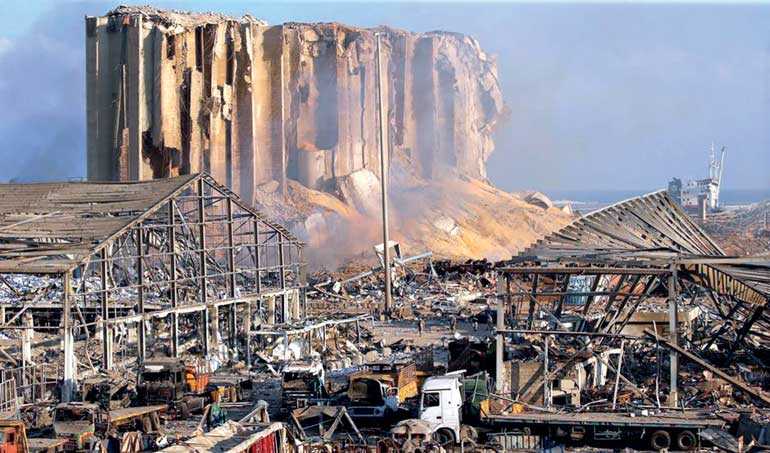Monday Feb 23, 2026
Monday Feb 23, 2026
Thursday, 6 August 2020 00:00 - - {{hitsCtrl.values.hits}}

A general view shows the damage at the site of Tuesday's blast in Beirut's port area, Lebanon
- Reuters
BEIRUT (Reuters): Lebanese rescue workers dug through rubble on Wednesday looking for survivors after a massive warehouse explosion sent a devastating blast wave across Beirut, killing at least 100 people and injuring nearly 4,000.
Officials said the toll was expected to rise after the blast at port warehouses that stored highly explosive material. The explosion was the most powerful ever to rip through Beirut, a city still scarred by civil war three decades ago and reeling from an economic meltdown and a surge in coronavirus infections.
President Michel Aoun said 2,750 tons of ammonium nitrate, used in fertilisers and bombs, had been stored for six years at the port without safety measures. He called it “unacceptable”.
An official source familiar with preliminary investigations blamed the incident on negligence. Ordinary Lebanese directed anger at politicians who have overseen decades of state corruption and bad governance that plunged the nation into financial crisis.
“It's like a war zone. I'm speechless,” Beirut's mayor, Jamal Itani, told Reuters while inspecting damage he estimated ran into billions of dollars. “This is a catastrophe for Beirut and Lebanon.” The head of Lebanon's Red Cross, George Kettani, said at least 100 people had been killed. “We are still sweeping the area. There could still be victims. I hope not,” he said.
The intensity of the blast threw victims into the sea and rescue teams were still trying to recover bodies. Many of those killed were port and custom employees and people working in the area or driving through during rush hour.
The Red Cross was coordinating with the Health Ministry to set up morgues because hospitals were overwhelmed, Kettani said.
Facades of central Beirut buildings were ripped off, furniture was sucked into streets and roads were strewn with glass and debris. Cars near the port were flipped over.
People walked around in shock, with helicopters overhead and teams searching for the missing at sea.
“This is the killer blow for Beirut, we are a disaster zone. My building shuddered, I thought it was an earthquake,” said Bilal, a man in his 60s, in the downtown area.
Like others, he blamed politicians. “We already have a financial economic crisis, people are hungry and, these thieves and looters, will they compensate for the losses? Who will compenstate for those who lost their loved ones,” he said.
Prime Minister Hassan Diab promised accountability for the blast at the “dangerous warehouse”, adding “those responsible will pay the price”. Officials did not say what caused the blaze that set off the blast. A security source and media said it was started by welding work being carried out on a hole in the warehouse.
The blast was heard as far away as Cyprus, a Mediterranean island about 100 miles (160 km) across the sea from Beirut.
The port district was left a tangled wreck, disabling the nation's main route for imports needed to feed a nation of more than six million people. Lebanon has already been struggling to house and feed hundreds of thousands of refugees from Syria.